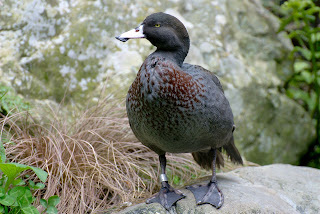5 day Environmental Bus Trip Tongariro National Park April 11-15
Just after Easter went on an adventure around Tongariro National Park to examine the environmental issues it faces and interview people who have key roles within those issues. This included looking at the pressures upon the park and its managers the Department of Conservation (DOC) from ever increasing number of people using the park for recreational purposes (i.e. Tongariro Crossing is experiencing 70-80,000 visitors a year). The conflict between protecting and enhancing the native flora and fauna, particularly threatened species of which there is a large number of(1/3) versus the impact and cost of managing visitor activities including large numbers of skiers (up to 10,000/day in winter) and hikers.
Compromising that delicate balancing act are the funding cuts to the Department and he edict from central government to adopt a 40-60 model with 60% of funds needing to come from commercial sources. Is DOC protecting the threatened species in the park or are they just treading water and managing people? Should an $8 billion tourism industry where visitors are largely coming to visit New Zealand’s national parks be serviced by a department existing on a frayed shoestring? What does this mean for the long term viability of our endemic species chiefly the endangered ones, do they know, what research if any has been done? Are decisions being made with long term considerations for future generations or are they heavily influenced by short term political expediency?
If the apex species was healthy that meant that the river ecosystem was mostly likely healthy too (e.g. the food chain interconnectedness, invertebrates like caddis and mayfly (whio’s food) would be plentiful indicating a healthy water system).What we found was a struggling whio population (severely endangered of <3,000 species whilst brown kiwi have >70,000). However Genesis Energy who run the Tongariro Power Scheme have recently poured resources ($2.5 million over 5 years) to help the whio recover. Part of this is a P.R. campaign to win public appeal which is good for business in a competitive market and part of the Resource Management Acts mitigation process. Genesis are making a difference to whio numbers primarily through stoat trapping control work along mountain river banks which is a good outcome remembering that the reduced habitat for the whio from the TPS is primarily why whio numbers were in such decline in the first place.
Widening the environmental picture was getting the spiritual perspective of the Ngati Rangi s towards the mountain rivers that flowed into their traditional lands and how this small iwi managed to win a victory in the Environmental Court against Genesis Power with all their accompanying financial and legal clout. Of course Genesis appealed to a Higher Court and now there are on-going negotiations to broker a deal. Hearing from the Ngati Rangi with their 1,000 year links to the land was very special and gave us an aspect of the longer term view of things as well as sharing some of the pain and hurt these people suffered when ignored or rejected by past and current economic and political policies.



No comments:
Post a Comment